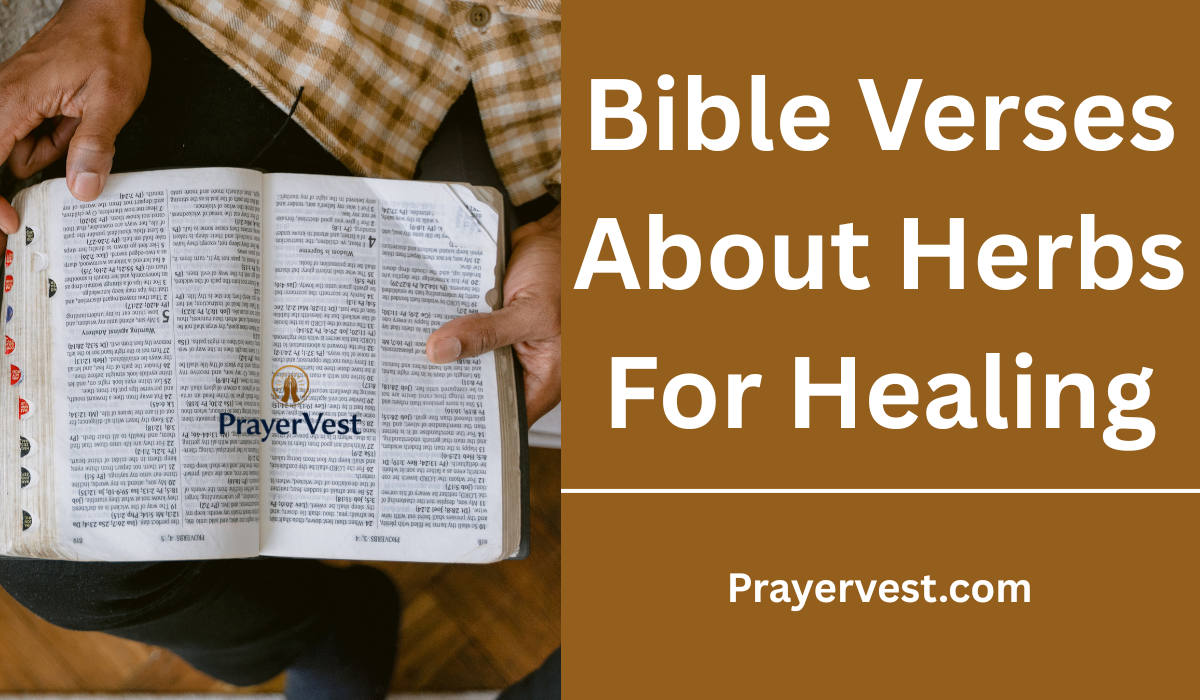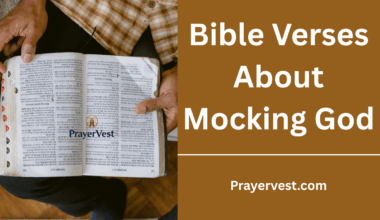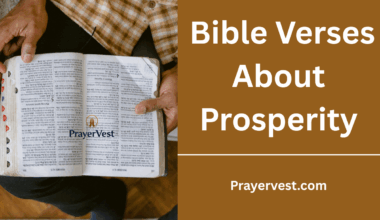Herbs are frequently mentioned in the Bible as a component of God’s supply for healing, sustenance, and health. The Bible acknowledges the importance of plants in maintaining life and promoting health, from the Garden of Eden, where all seed-bearing plants were given for nourishment, to the leaves of the tree in Revelation, which are said to be “for the healing of the nations.”
Natural cures played a significant role in biblical life, as seen by the use of herbs in anointing oils, healing balms, and even ceremonial cleansings. These allusions serve as a reminder that God, in His wisdom, has endowed the planet with resources that support both spiritual and bodily health.
Herbs were used in biblical times for both utilitarian and symbolic purposes. Practically speaking, hyssop, frankincense, myrrh, and aloe were prized for their fragrant and therapeutic qualities.
They provided solace in sickness, cleansed areas, and treated wounds. Herbs were frequently used as symbols for purification, rebirth, and God’s concern for His people. Examining these passages reveals both spiritual faith in the Great Physician and heavenly support for natural methods of fostering health.


These Bible passages regarding medicinal herbs encourage us to recognize the value and beauty of God’s creation. They promote a well-rounded perspective, acknowledging herbs as a gift for health while keeping in mind that the Lord is the source of ultimate healing. May these scriptures encourage you to accept God’s provision, look for guidance in taking care of your body, and stay rooted in the knowledge that He is the source of all restoration, whether it be through natural cures or supernatural intervention.
40 Powerful Bible Verses About Herbs For Healing (2026)
1. Genesis 1:29
“Then God said, ‘I give you every seed-bearing plant on the face of the whole earth and every tree that has fruit with seed in it. They will be yours for food.’”
In the very beginning, God provided plants and herbs as part of His perfect creation to sustain and nourish life. This verse reveals that herbs are not merely for flavor or beauty, but also a divine provision for human well-being. From their seeds to their leaves, plants carry natural healing properties that align with God’s intention for holistic health. Here we see that herbs are a gift, designed not just for sustenance but also for supporting life in balance with creation.
2. Ezekiel 47:12
“Their fruit will serve for food and their leaves for healing.”
In Ezekiel’s vision of the river flowing from the temple, the trees lining its banks bear fruit each month, and their leaves possess healing power. This vivid image portrays God as the ultimate source of life and restoration, using the natural world—specifically plants and herbs—as a channel for His healing work. It is a reminder that God’s provision for health often comes through the simple yet profound remedies He has placed in creation, reinforcing that natural healing is a reflection of His sustaining love.
3. Psalm 104:14
“He makes grass grow for the cattle, and plants for people to cultivate—bringing forth food from the earth.”
This psalm celebrates God’s intimate involvement in sustaining all life. Herbs and plants are part of His intentional design, not random occurrences. They sprout under His command, offering nourishment, medicine, and vitality to both people and animals. This verse reminds us that cultivating herbs is a sacred act, partnering with God’s provision for our health and wellness.
4. Proverbs 15:17
“Better a small serving of vegetables with love than a fattened calf with hatred.”
Though often read as a lesson on relationships, this proverb also reflects the nourishing simplicity of God’s plant-based gifts. Herbs and vegetables offer sustenance that can heal the body, while love and peace heal the soul. It is a gentle nudge to embrace humble, wholesome, and God-given nourishment over excess and strife.
5. Isaiah 38:21
“Isaiah had said, ‘Prepare a poultice of figs and apply it to the boil, and he will recover.’”
Here, God uses the prophet Isaiah to give King Hezekiah a healing instruction—one that includes a natural remedy made from figs. This moment shows the intersection of faith and practical medicine, where herbs and fruits become instruments of God’s restorative power. It reinforces that divine healing can work through the tangible resources He provides in nature.
6. Jeremiah 8:22
“Is there no balm in Gilead? Is there no physician there?”
This rhetorical question points to the famous healing balm derived from plants in the region of Gilead. Though spoken in a context of spiritual lament, it acknowledges the recognized medicinal value of herbal remedies in biblical times. It serves as a metaphor for God’s ability to heal not only the body but also the deepest wounds of the soul.
7. Jeremiah 46:11
“Go up to Gilead and get balm, O Virgin Daughter of Egypt. But you multiply remedies in vain; there is no healing for you.”
This verse warns that while herbal remedies are beneficial, they are not a substitute for God’s intervention. Egypt’s futile attempts to heal without turning to the Lord illustrate that true restoration comes when natural means and divine power work together. Herbs are powerful, but they are most effective when used with a heart dependent on God.
8. Ezekiel 34:29
“I will provide for them a land renowned for its crops, and they will no longer be victims of famine in the land or bear the scorn of the nations.”
This promise speaks to God’s abundant provision, which includes fruitful harvests and healing herbs. The “land renowned for its crops” symbolizes health, security, and divine care. When God blesses the land, herbs and plants flourish, becoming both physical nourishment and a testament to His covenant faithfulness.
9. Ezekiel 47:9
“Swarms of living creatures will live wherever the river flows. There will be large numbers of fish, because this water flows there and makes the salt water fresh; so where the river flows everything will live.”
This verse highlights the life-giving nature of God’s provision, with the river nourishing plant life along its banks. The herbs and trees that grow from such a source are infused with vitality and healing. It’s a beautiful reminder that true health—physical and spiritual—comes from being connected to the life-giving flow of God.
10. Song of Songs 4:14
“Nard and saffron, calamus and cinnamon, with every kind of incense tree, with myrrh and aloes and all the finest spices.”
This poetic verse lists an array of herbs and spices known for their fragrance, flavor, and medicinal properties. In biblical times, such plants were used in perfumes, healing ointments, and ceremonial rituals. The beauty of creation is revealed here in the variety of herbs that not only heal but also bring joy to the senses.
11. Matthew 23:23
“Woe to you, teachers of the law and Pharisees, you hypocrites! You give a tenth of your spices—mint, dill and cumin. But you have neglected the more important matters of the law—justice, mercy and faithfulness.”
Jesus’ mention of mint, dill, and cumin reveals how common herbs were valued and cultivated in daily life. While He corrects misplaced priorities, this verse affirms the significance of herbs in the cultural and spiritual practices of the time. God’s creation is to be used wisely, not merely as ritual, but in ways that honor His greater purposes.
12. Luke 10:34
“He went to him and bandaged his wounds, pouring on oil and wine. Then he put the man on his own donkey, brought him to an inn and took care of him.”
The Good Samaritan uses natural remedies—oil and wine—to disinfect and soothe wounds. This story demonstrates that compassion and practical healing go hand in hand. God often equips us with herbs, oils, and other natural resources to bring restoration to the hurting, both physically and emotionally.
13. Revelation 22:2
“On each side of the river stood the tree of life, bearing twelve crops of fruit, yielding its fruit every month. And the leaves of the tree are for the healing of the nations.”
This final vision of Scripture connects healing directly to God’s creation. The leaves—herbal in nature—are divinely appointed to restore health on a global scale. It is a reminder that God’s ultimate plan for humanity includes perfect healing, made possible through His provision in both the natural and spiritual realms.
14. Genesis 9:3
“Everything that lives and moves about will be food for you. Just as I gave you the green plants, I now give you everything.”
After the flood, God reaffirms His provision for humanity, including the green plants and herbs essential for health. This verse underscores that herbs are a part of God’s covenant care, intended to nourish, strengthen, and sustain human life across generations.
15. Leviticus 25:19
“Then the land will yield its fruit, and you will eat your fill and live there in safety.”
God promises abundant harvests when His people follow His commands. This includes herbs, fruits, and healing plants springing forth from the soil. The verse teaches that obedience to God not only brings spiritual blessing but also ensures the flourishing of the land’s natural remedies.
16. Deuteronomy 8:8
“A land with wheat and barley, vines and fig trees, pomegranates, olive oil and honey.”
This description of the Promised Land reflects abundance and health. Among its treasures are plants and herbs known for their healing benefits. God’s blessings often come wrapped in the natural bounty of the earth, reminding us to treasure and cultivate these gifts.
17. Job 38:27
“To satisfy a desolate wasteland and make it sprout with grass?”
In God’s rhetorical question to Job, we see His power to bring life and healing even to barren places. The grass and herbs that grow are not only symbols of renewal but also tangible resources for health and restoration.
18. Psalm 147:8
“He covers the sky with clouds; he supplies the earth with rain and makes grass grow on the hills.”
This verse highlights God’s role in sustaining plant life through the cycle of rain and growth. The herbs that flourish because of His provision become sources of nourishment and healing for all living things.
19. Isaiah 61:11
“For as the soil makes the sprout come up and a garden causes seeds to grow, so the Sovereign Lord will make righteousness and praise spring up before all nations.”
Here, the flourishing of plants is a metaphor for spiritual renewal. Just as herbs spring from the soil to heal and nourish, God’s righteousness rises in His people to restore and bless the world.
20. Hosea 14:5
“I will be like the dew to Israel; he will blossom like a lily. Like a cedar of Lebanon he will send down his roots.”
Dew brings life to plants and herbs, causing them to flourish. In this verse, God’s refreshing presence is likened to the gentle nourishment that helps herbs grow strong, reminding us that physical healing is often a reflection of His spiritual renewal.
21. Matthew 6:28-29
“See how the flowers of the field grow. They do not labor or spin. Yet I tell you that not even Solomon in all his splendor was dressed like one of these.”
Jesus points to the beauty and provision of plants to illustrate God’s care. Herbs, flowers, and plants grow without striving, yet they thrive under His hand, showing us that our health and provision ultimately rest in His loving design.
22. Mark 4:31-32
“It is like a mustard seed, which is the smallest of all seeds on earth. Yet when planted, it grows and becomes the largest of all garden plants, with such big branches that the birds can perch in its shade.”
The mustard plant, used for seasoning and medicinal purposes, becomes a picture of how God’s kingdom—and His provision—starts small but grows abundantly. Healing can also begin in small ways, gradually bringing wholeness through the resources He has planted in creation.
23. Romans 14:2
“One person’s faith allows them to eat anything, but another, whose faith is weak, eats only vegetables.”
Paul addresses differences in diet within the early church, acknowledging the role of plant-based nourishment. Herbs and vegetables are a God-given option for sustenance and health, pointing to the diversity of ways His creation can meet our needs.
14. Genesis 9:3
“Everything that lives and moves about will be food for you. Just as I gave you the green plants, I now give you everything.”
After the flood, God reaffirms His provision for humanity, including the green plants and herbs essential for health. This verse underscores that herbs are a part of God’s covenant care, intended to nourish, strengthen, and sustain human life across generations.
15. Leviticus 25:19
“Then the land will yield its fruit, and you will eat your fill and live there in safety.”
God promises abundant harvests when His people follow His commands. This includes herbs, fruits, and healing plants springing forth from the soil. The verse teaches that obedience to God not only brings spiritual blessing but also ensures the flourishing of the land’s natural resources.
16. Deuteronomy 8:8
“A land with wheat and barley, vines and fig trees, pomegranates, olive oil and honey.”
This description of the Promised Land reflects abundance and health. Among its treasures are plants and herbs known for their healing benefits. God’s blessings often come wrapped in the natural bounty of the earth, reminding us to treasure and cultivate these gifts.
17. Job 38:27
“To satisfy a desolate wasteland and make it sprout with grass?”
In God’s rhetorical question to Job, we see His power to bring life and healing even to barren places. The grass and herbs that grow are not only symbols of renewal but also tangible resources for health and restoration.
18. Psalm 147:8
“He covers the sky with clouds; he supplies the earth with rain and makes grass grow on the hills.”
This verse highlights God’s role in sustaining plant life through the cycle of rain and growth. The herbs that flourish because of His provision become sources of nourishment and healing for all living things.
19. Isaiah 61:11
“For as the soil makes the sprout come up and a garden causes seeds to grow, so the Sovereign Lord will make righteousness and praise spring up before all nations.”
Here, the flourishing of plants is a metaphor for spiritual renewal. Just as herbs spring from the soil to heal and nourish, God’s righteousness rises in His people to restore and bless the world.
20. Hosea 14:5
“I will be like the dew to Israel; he will blossom like a lily. Like a cedar of Lebanon he will send down his roots.”
Dew brings life to plants and herbs, causing them to flourish. In this verse, God’s refreshing presence is likened to the gentle nourishment that helps herbs grow strong, reminding us that physical healing is often a reflection of His spiritual renewal.
21. Matthew 6:28-29
“See how the flowers of the field grow. They do not labor or spin. Yet I tell you that not even Solomon in all his splendor was dressed like one of these.”
Jesus points to the beauty and provision of plants to illustrate God’s care. Herbs, flowers, and plants grow without striving, yet they thrive under His hand, showing us that our health and provision ultimately rest in His loving design.
22. Mark 4:31-32
“It is like a mustard seed, which is the smallest of all seeds on earth. Yet when planted, it grows and becomes the largest of all garden plants, with such big branches that the birds can perch in its shade.”
The mustard plant, used for seasoning and medicinal purposes, becomes a picture of how God’s kingdom—and His provision—starts small but grows abundantly. Healing can also begin in small ways, gradually bringing wholeness through the resources He has planted in creation.
23. Romans 14:2
“One person’s faith allows them to eat anything, but another, whose faith is weak, eats only vegetables.”
Paul addresses differences in diet within the early church, acknowledging the role of plant-based nourishment. Herbs and vegetables are a God-given option for sustenance and health, pointing to the diversity of ways His creation can meet our needs.
24. 1 Corinthians 3:7
“So neither the one who plants nor the one who waters is anything, but only God, who makes things grow.”
This verse reminds us that while we may plant herbs and care for them, the true source of life and healing is God. He is the one who gives growth, potency, and the restorative properties found in His creation.
25. 1 Timothy 4:4
“For everything God created is good, and nothing is to be rejected if it is received with thanksgiving.”
Herbs, plants, and natural remedies are part of God’s good creation. When used with gratitude and discernment, they become channels of His blessing and tools for health and healing.
26. James 5:14
“Is anyone among you sick? Let them call the elders of the church to pray over them and anoint them with oil in the name of the Lord.”
Here, anointing oil—a natural substance derived from plants—is used alongside prayer for healing. This shows the beautiful harmony between spiritual intercession and the God-given resources of the earth.
27. Revelation 8:3–4
“Another angel, who had a golden censer, came and stood at the altar. He was given much incense to offer, with the prayers of all God’s people, on the golden altar in front of the throne. The smoke of the incense, together with the prayers of God’s people, went up before God from the angel’s hand.”
Incense, often made from herbs and resins, is pictured here as part of heavenly worship. Its fragrant smoke symbolizes prayer rising to God, showing that herbs have both practical and sacred roles in God’s plan.
28. Exodus 30:23
“Take the following fine spices: 500 shekels of liquid myrrh, half as much of fragrant cinnamon, 250 shekels of fragrant calamus.”
God gave Moses specific instructions to prepare anointing oil from herbs and spices. These ingredients were valued for their fragrance, healing qualities, and role in consecrating people and places for holy use.
29. Numbers 11:5
“We remember the fish we ate in Egypt at no cost—also the cucumbers, melons, leeks, onions and garlic.”
This verse recalls herbs and vegetables that were part of the Israelites’ diet in Egypt. Many of these plants also carry healing benefits, reminding us that God has long provided natural foods for strength and health.
30. 2 Kings 20:7
“Then Isaiah said, ‘Prepare a poultice of figs.’ They did so and applied it to the boil, and he recovered.”
Reiterating God’s use of natural remedies, this verse records how figs—rich in healing properties—were applied to bring about physical recovery. It’s a biblical example of herbal medicine in action.
31. Proverbs 27:25
“When the hay is removed and new growth appears and the grass from the hills is gathered in.”
This verse points to the seasonal cycles of plant growth. Herbs and grasses are gathered for nourishment and care, a reminder of God’s orderly provision for both human and animal health.
32. Isaiah 55:12-13
“The mountains and hills will burst into song before you, and all the trees of the field will clap their hands. Instead of the thornbush will grow the juniper, and instead of briers the myrtle will grow.”
The flourishing of herbs and trees is depicted as a sign of God’s blessing and restoration. Healing comes when God transforms the land, replacing harmful plants with those that nourish and heal.
33. Jeremiah 17:8
“They will be like a tree planted by the water that sends out its roots by the stream. It does not fear when heat comes; its leaves are always green.”
This imagery describes vitality and resilience—traits also found in herbs rooted in rich soil. God’s provision ensures that His creation thrives and offers healing, even in harsh conditions.
34. Matthew 13:31-32
“The kingdom of heaven is like a mustard seed, which a man took and planted in his field. Though it is the smallest of all seeds, yet when it grows, it is the largest of garden plants.”
The mustard plant, valued for flavor and medicinal uses, becomes a metaphor for growth and potential. Healing often begins with small, faithful steps, just as mighty plants spring from tiny seeds.
35. Mark 6:13
“They drove out many demons and anointed many sick people with oil and healed them.”
In this passage, oil derived from plants is used alongside prayer to bring healing. It shows that God can work through natural means empowered by faith.
36. Luke 7:46
“You did not put oil on my head, but she has poured perfume on my feet.”
Herbal oils and perfumes were used in ancient times not only for beauty but also for medicinal and refreshing purposes. Here, the act is symbolic of honor, but it also reflects the soothing qualities of natural plant oils.
37. John 19:39-40
“He was accompanied by Nicodemus, the man who earlier had visited Jesus at night. Nicodemus brought a mixture of myrrh and aloes, about seventy-five pounds.”
Myrrh and aloes—both derived from plants—were used in the burial preparation of Jesus. These herbs had preservative and aromatic qualities, showing their significance in both health and ritual.
38. Acts 27:34-36
“Now I urge you to take some food. You need it to survive. Not one of you will lose a single hair from his head.”
Though not directly naming herbs, this moment emphasizes the role of nourishment for survival and recovery. Many biblical diets included herbs as essential sources of strength.
39. 1 Peter 1:24-25
“All people are like grass, and all their glory is like the flowers of the field; the grass withers and the flowers fall, but the word of the Lord endures forever.”
This verse compares human life to the fleeting beauty of plants, yet it acknowledges their place in God’s creation. Herbs and flowers have their season of healing and beauty, but God’s Word remains eternal.
40. Revelation 22:1-2
“Then the angel showed me the river of the water of life, as clear as crystal, flowing from the throne of God and of the Lamb down the middle of the great street of the city. On each side of the river stood the tree of life… and the leaves of the tree are for the healing of the nations.”
This final vision brings the theme full circle—God’s creation, filled with healing leaves and herbs, is part of His eternal plan for restoration. Physical and spiritual healing meet in the presence of the Creator, where health is complete and everlasting.
Conclusion
The Bible’s allusions to medicinal herbs serve as a reminder that God has interwoven healing and restoration into the very fabric of His creation. Plants and herbs are shown as benefits meant for our sustenance, healing, and rejuvenation from the very first pages of Scripture to the prophetic visions of Revelation. They are spiritual representations of God’s sustaining grace in addition to being therapeutic cures. These natural gifts, whether utilized for nutritional purposes, incense, or ointments in the past, demonstrate God’s desire for His people to live in peace and health.
As we consider these verses, we are urged to view herbs with appreciation, discernment, and wisdom, acknowledging their role in God’s comprehensive provision for our lives. They serve as a reminder that completeness in body, mind, and spirit is what healing is all about, not just the absence of disease. We can adopt a well-rounded road to wellness that honors the Creator, who is the ultimate source of all genuine healing, by appreciating both natural cures and spiritual instruction.






